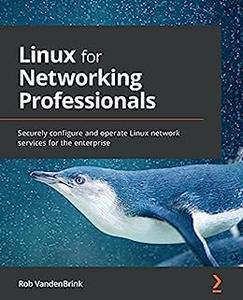
Free Download Linux for Networking Professionals: Securely configure and operate Linux network services for the enterprise by Rob VandenBrink
English | November 11, 2021 | ISBN: 1800202393 | 528 pages | MOBI | 41 Mb
Get to grips with the most common as well as complex Linux networking configurations, tools, and services to enhance your professional skills
Key Features
Learn how to solve critical networking problems using real-world examples
Configure common networking services step by step in an enterprise environment
Discover how to build infrastructure with an eye toward defense against common attacks
Book Description
As Linux continues to gain prominence, there has been a rise in network services being deployed on Linux for cost and flexibility reasons. If you are a networking professional or an infrastructure engineer involved with networks, extensive knowledge of Linux networking is a must.
This book will guide you in building a strong foundation of Linux networking concepts. The book begins by covering various major distributions, how to pick the right distro, and basic Linux network configurations. You'll then move on to Linux network diagnostics, setting up a Linux firewall, and using Linux as a host for network services. You'll discover a wide range of network services, why they're important, and how to configure them in an enterprise environment. Finally, as you work with the example builds in this Linux book, you'll learn to configure various services to defend against common attacks. As you advance to the final chapters, you'll be well on your way towards building the underpinnings for an all-Linux datacenter.
By the end of this book, you'll be able to not only configure common Linux network services confidently, but also use tried-and-tested methodologies for future Linux installations.
What you will learn
Use Linux as a troubleshooting and diagnostics platform
Explore Linux-based network services
Configure a Linux firewall and set it up for network services
Deploy and configure Domain Name System (DNS) and Dynamic Host Configuration Protocol (DHCP) services securely
Configure Linux for load balancing, authentication, and authorization services
Use Linux as a logging platform for network monitoring
Deploy and configure Intrusion Prevention Services (IPS)
Set up Honeypot solutions to detect and foil attacks
Who this book is for
This book is for IT and Windows professionals and admins looking for guidance in managing Linux-based networks. Basic knowledge of networking is necessary to get started with this book.
Table of Contents
Welcome to the Linux Family
Basic Linux Network Configuration and Operations - Working with Local Interfaces
Using Linux and Linux Tools for Network Diagnostics
The Linux Firewall
Linux Security Standards with Real-Life Examples
DNS Services on Linux
DHCP Services on Linux
Certificate Services on Linux
RADIUS Services for Linux
Load Balancer Services for Linux
Packet Capture and Analysis in Linux
Network Monitoring Using Linux
Intrusion Prevention Systems on Linux
Honeypot Services on Linux
